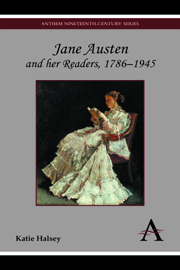Book contents
- Frontmatter
- Contents
- Acknowledgements
- Part One
- Part Two
- Introduction
- 4 Austen's Readers: Contexts I
- 5 Austen's Readers: Contexts II
- 6 Austen's Readers I: Affection and Appropriation
- 7 Austen's Readers II: Opposition and Resistance
- 8 Austen's Readers III: Friendship and Criticism
- 9 Austen's Readers IV: Sociability and Devotion
- Conclusion
- Notes
- Bibliography
- Index
6 - Austen's Readers I: Affection and Appropriation
from Part Two
Published online by Cambridge University Press: 05 July 2012
- Frontmatter
- Contents
- Acknowledgements
- Part One
- Part Two
- Introduction
- 4 Austen's Readers: Contexts I
- 5 Austen's Readers: Contexts II
- 6 Austen's Readers I: Affection and Appropriation
- 7 Austen's Readers II: Opposition and Resistance
- 8 Austen's Readers III: Friendship and Criticism
- 9 Austen's Readers IV: Sociability and Devotion
- Conclusion
- Notes
- Bibliography
- Index
Summary
Although discussion of Austen's earliest readers, in the shape of her family and immediate circle of friends, has already informed the argument of this book thus far, we will begin our detailed analysis of Austen's individual readers with the first generation of her literary successors, primarily with female authors, as these are the readers for whom the kinds of questions, problems and issues outlined in the previous chapters are most pressing. Austen's female successors frequently needed to establish themselves, as readers and writers, in opposition to the kinds of stereotypes and clichés discussed in Chapters 1 and 5. This chapter and those following discuss the implications of writers' various interactions with Austen's name in establishing their literary identities. As we will see, over the course of the long nineteenth century, Jane Austen became the publicly acceptable face of the woman writer, and, as literary women, writers from Mary Russell Mitford to Katherine Mansfield and Virginia Woolf compared themselves to Austen. They were also aware of the ways in which they were both implicitly and explicitly compared to her. Their reactions to her reveal important truths, not only about the ways in which Austen's novels acted on her successors, but about those successors' fears, insecurities and doubts about their position in the literary marketplace, their duties as professional women writers, and their responsibilities as women. Their negotiations with Austen's name show up their priorities as readers and writers, manifested in discussions over the characteristics of great literature, the proper behaviour for a professional female writer, the importance of a female tradition, the value of emotional responses, and debates about what a novel should be.
- Type
- Chapter
- Information
- Jane Austen and her Readers, 1786–1945 , pp. 135 - 152Publisher: Anthem PressPrint publication year: 2012



